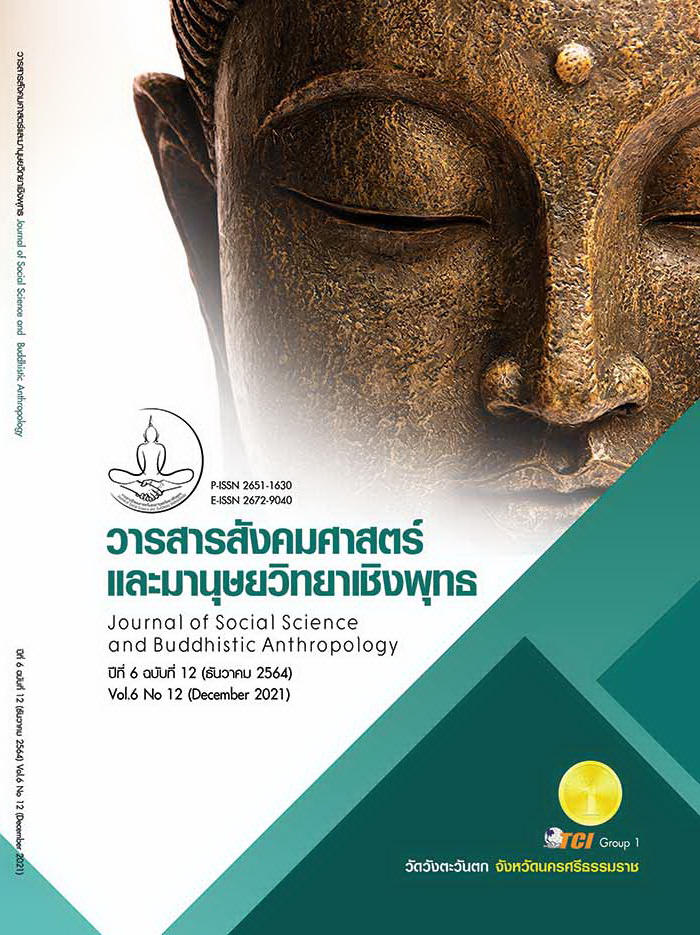THE INFLUENCING OF FACEBOOK USAGE FOR INFORMATION ON POLITICAL INTEREST AND PARTICIPATION IN POLITICS
Keywords:
Facebook Usage for Information, Political Interest, Participation in PoliticsAbstract
The objective of this research article were to 1) study the characteristic of Facebook usage for information on the participation in politics 2) study the influencing of Facebook usage on political interest, political knowledge, political discussion, political participation and voting. The researcher developed 34 items of a questionnaire and collected from 397 respondents of the people over 18 years who located in the lower of the North Eastern of Thailand. The simple random was used. The statistical analysis are frequency, percentage, means, standard deviation, and F-test MANOVA analysis of variance. The results found that 1) the characteristic of Facebook usage for following political information contributed 49.6% and 30.5% represented the characteristic of following political information in terms of newspaper, television or radio as traditional media. 2) the influencing of Facebook usage impacted significantly on political interest such as political knowledge, political discussion and political participation meanwhile, the influencing of perceived usefulness of current information and political knowledge from peer group in Facebook predicted significantly on political interest at coefficient R2 = .09. Besides, the following of information from non-government group and national politician predicted political knowledge and political discussion at R2 = .04, .06, respectively. Moreover, the influencing of the following local politician news and national politician still impacted simultaneously on political participation at R2 = .10. Importantly, the next election voting influenced simultaneously the following news from government and non-government through radio or television at R2 = .06.
References
พิชญ์ พงษ์สวัสดิ์. (16 มิถุนายน 2563). ความเคลื่อนไหวในสมการอำนาจใหม่. มติชนรายวัน.
Ali, F. H. & Qazi, A. A. (2019). Can social media platforms enable co-creation as a tool in political marketing? The south Asian context. A Research Journal of South Asian Studies, 34(1), 81-102.
Bennett, W. L. (2012). The personalization of politics. The ANNALS of the American Academy of Political and Social Science, 644(1), 20-39.
Bimber, B. & Copeland, L. (2013). Digital Media and Traditional Political Participation Over Time in the U.S. Journal of Information Technology & Politics, 10(2), 125-137.
Bimber, B. (2012). Digital media and citizenship. In Semetko, H. A. & Scammell, M. (ed.). The SAGE handbook of political communication. Los Angeles: SAGE (pp. 115-127).
Boulianne, S. (2016). Online news, civic awareness, and engagement in civic and political life. New Media & Society, 18(9), 180-56.
Cacciatore, M. A. et al. (2018). Is Facebook making us dumber? Exploring social media use as a predictor of political knowledge. Journalism & Mass Communication, 14(4), 421-430.
Castells, M. (2012). Networks of outrage and hope social movements in the Internet age. Chichester: UK: Wiley.
Chou, L. C. & Fu, C. Y. (2017). The influence of internet on politics: the impact of facebook and the internet penetration on election in Taiwan. Applied Economics Letters, 24(7), 494-497.
Crompton, R. (2008). Class and Stratification. (3rd edition). Cambridge: Polity.
de Zuniga, H. G. et al. (2014). Social Media, Political Expression, and Political Participation: Panel Analysis of Lagged and Concurrent Relationships. Journal of Communication, 64(4), 612-634.
DeVito, M. A. (2016). From editors to algorithms: A values-based approach to understanding story selection in the Facebook news feed. Digital Journalism, 5(6), 753-773.
Dimitrova, D. V. et al. (2011). The effect of digital media on political knowledge and participation in election campaigns. Communication research, 41(1), 95-118.
Dommett, K. & Temple, L. (2017). Digital campaigning: the rise of Facebook and satellite campaigns. Parliamentary Affairs, 71(S1), 189-202.
Flew, T. (2008). New Media: an introduction. Melbourne: Oxford University.
Gustafsson, N. (2010). This Time It's Personal: Social Networks, Viral Politics and Identity Management. In Emerging Practices in Cyber culture and Social Networking.
Kushwah, S. et al. (2017). Evolution of a framework of co-creation in political marketing: select cases. International Review on Public and Nonprofit Marketing, 14(4), 427-445.
Metaxas, P. T. et al. (2011). How (not) to predict elections. In Privacy, security, risk and trust (PASSAT), 2011 IEEE third international conference on social computing (SocialCom). IEEE.
Naaman, M. et al. (2010). message content in social awareness streams. In: Proceedings of the 2010 ACM conference on computer supported cooperative work. New York: NY, USA: ACM, CSCW’ 10.
Quintelier, E. & Vissers, S. (2008). The effect of internet user on political participation. Social Science Computer Review, 26(4), 411-27.
Rojas, H. & Puig-I-Abril, E. (2009). Mobilizers Mobilized: Information, Expression, Mobilization and Participation in the Digital Age. Journal of Computer-Mediated Communication, 14(4), 902-27.
Wang, S. (2017). How much news makes it into people’s Facebook feeds? Our experiment suggests not much. Retrieved December 12, 2020, from https://www.niemanlab.org/2017/12/how-much-news-makes-it-into-peoples-facebook-feeds-our-experiment-suggests-not-much/
Wolfsfeld, G. et al. (2015). Political information repertoires and political participation. New Media & Society, 18(9), 2096-2115.
Xenos, M. & Moy, P. (2007). Direct and differential effects of the internet on political and civic engagement. Journal of Communication, 57(4), 704-718.









